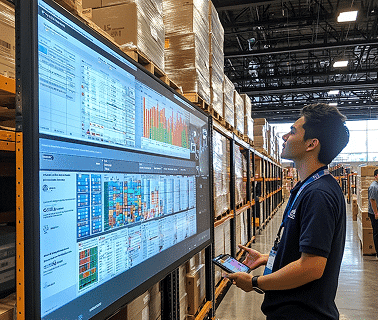Listen to this blog
For most businesses, ensuring that products reach customers is a significant goal, but in healthcare, it’s vital because lives hinge on receiving supplies and medications promptly. Providing quality patient care swiftly is essential, as underscored by the recent COVID-19 pandemic.
Effective connections and communications among suppliers, manufacturers, and distributors are necessary to streamline the flow of goods, services, and information. This enables hospitals and other healthcare facilities to more effectively address patient requirements and enhance their financial outcomes.
Why supply chain management in healthcare?
Healthcare supply chain management is a collection of processes, teams, and the transportation of medicines, medical tools, and other products required by healthcare professionals to execute their jobs.
Another goal of supply chain management in the healthcare industry is to identify departmental weaknesses and provide prevention solutions. It tries to identify weak areas to attain desired health outcomes and to improve global health investments.
When companies use digital tools and technology to manage healthcare supply chains, they use actionable insights from multi-source data to alter and enhance supply chain structures and operations continuously.
Benefits of supply chain management in healthcare
Following are some of the benefits of supply chain management in healthcare.
- Reduce operational costs
Medical producers rely on supply chain managers to design networks that match customer objectives at the lowest possible overall cost. Efficient logistics enable medical enterprises to compete more effectively in the marketplace.
Healthcare organizations are occasionally overcharged due to pricing fluctuations and errors made when deliveries are delayed, adding to unanticipated shortages and insufficient inventory controls.
- Better processes
Some of the biggest problems in healthcare logistics are keeping devices working and clean, getting rid of waste, storing and keeping track of inventory, and shipping. When faced with issues such as a lack of suitable storage space, rising labor prices, and typical tedious techniques, it is the greatest alternative solution with solid logistics and supply chain management.
- Help in automation
Supply chain software simplifies and automates typical manual procedures carried out inside healthcare organizations with the simple goal of enhancing the supply chain process. One of the numerous benefits of software automation is its capacity to streamline inventory, decrease waste, enable quick, data-driven choices, and save labor, supply, and operational costs.
For these reasons, enlisting the assistance of supply chain software development organizations is becoming increasingly important.
- Gives a competitive advantage
Digitizing the supply chain makes it possible for healthcare providers to get the exact product to the patient at the right time and at a low cost.
Healthcare providers will be better placed to take advantage of technological developments in the data flow, analytics, provider-patient interaction, asset monitoring, and regulatory requirements by establishing a digital supply chain, which also implies that the future of healthcare is digital.
- Improve the three C’s
Supply chain management focuses on enhancing the three Cs: communication, collaboration, and coordination between vendors, suppliers, transportation firms, and shipping organizations.
Supply chain management employs a centralized distribution approach, ensuring reliability for end users and providing correct output results. For more information, see our blog on the importance of vendor management.
- Increased transparency
Logistics is an important component of supply chain management, with duties such as developing precise systems to plan and coordinate the complex movement of goods by delivering timely, safe, and dependable shipments.
Day-to-day logistics services vary depending on the business but often include order processing, warehousing, and, last but not least, shipping.
In addition to these items, logisticians provide data summaries to supply chain partners to improve the visibility of commodities as they transit from point A to point B. Logistics partners should improve transparency by coordinating live tracking updates and establishing open communication channels to increase customer service. Learn more about the importance of logistics in the retail industry.
- Aids in demand forecasting
They may use healthcare supply chain analytics to estimate demand correctly, improve stock planning and management, and respond more quickly to changing market conditions by combining supply chain and clinical data.
Digital supply chain management technologies can assist raise productivity and reducing time to market by fostering improved communication and cooperation throughout the healthcare supply chain.
They help to develop a healthcare value chain that can respond directly to and recover from the difficulties of future pandemics and other public health catastrophes by enhancing confidence and openness across the supply network.
Challenges in healthcare supply chain management
The intricacy of the healthcare supply chain is compounded by factors like product diversity, fluctuating demand patterns, strict regulatory mandates, and the imperative for precise inventory control. Access to accurate and timely data is crucial for effective decision-making and optimizing inventory.
Challenges within the healthcare supply chain often revolve around issues such as managing inventory, predicting demand, controlling costs, and ensuring product quality and safety standards. Shortages, stockouts, or disruptions in the supply chain can significantly impact patient care, leading to treatment delays or limitations.
Supply Chain Management SCM in healthcare – best practices
The best practices listed below, with examples, can help anyone prevent mistakes and make the right choices:
- Inventory management
You must ensure that your materials department orders the correct volume of supplies to match the volume used by your personnel. There shouldn’t be surplus material ordered based on someone’s gut instinct, and all of this occurs without risking the safety of your patients.
- Centralize and categorize storage
Streamline supply management by implementing an automated inventory system to enhance efficiency and precision. Allocate specific storage spaces for medical equipment and supplies, ensuring convenient access for staff. Classify inventory according to product type, expiration dates, and usage frequency to streamline retrieval and minimize the likelihood of expired or misplaced items. Enforce a first-in, first-out (FIFO) and last-in, first-out (LIFO) method to maintain proper rotation and maximize inventory usage.
- The advancement of technology
Organizations worldwide have been able to adjust their services with cutting-edge technology, solutions, and resources. Globally, supply chain management has grown in popularity as firms integrate their essential business activities from beginning to end.
For example, E-procurement and sophisticated supply chain planning systems have been released as advanced software and solutions. These software solutions have many applications in the healthcare supply chain management system. They can be utilized at numerous stages of the supply chain management process, including procurement, manufacturing, transportation, and storage.
- Adopting cloud-based solutions
Cloud-based systems have several advantages, including reducing capital and running costs. The system requires no hardware or IT infrastructure, allowing businesses to optimize supply chain operations while avoiding capital expenses.
Furthermore, these solutions aid in consolidating various systems, such as warehouse management systems and transportation cost management, which are crucial for supply chain operations. Cloud technology assists healthcare businesses in coordinating and consolidating information with particular solutions to avoid miscommunications and lost savings.
Cloud computing also offers benefits to Small and Medium-sized Enterprises (SMEs) and on-premise IT systems, such as cost-effectiveness and the ability to minimize the total cost of ownership through pay-per-use. As a result of the benefits associated with this technology, healthcare systems worldwide have begun to incorporate cloud-based solutions in their supply chain operations.
It’s critical to understand what’s going on in your materials department. Any adjustments that need to be made should be executed as soon as possible so that savings can be realized. The materials portion of the supply chain can be leaner.
Read more: Online supply chain management courses to enhance your career
Supply chain job roles in healthcare
The healthcare industry is booming and there are a plethora of job opportunities to explore. Here is the list of the job roles in supply chain management in the healthcare industry:
| Jobs | Salary |
| Supply Chain Manager | INR 17 LPA |
| Supply Chain Executive | INR 4.5 LPA |
| Supply Chain Analyst | INR 6.5 LPA |
| Associate Supply Chain Manager | INR 13.3 LPA |
Read more: High paying jobs roles in supply chain management
Conclusion
Supply chain management in the healthcare industry has shown to be a game changer, assisting healthcare providers in enhancing the patient experience, reducing manual errors in everyday business processes, optimizing inventory, and automating departmental activities.
As you are aware, supply chain management is a key function in the healthcare industry, and if you want to follow a profession in this field, Manipal Academy of Higher Education (MAHE) is the best option. Through Online Manipal, MAHE provides the best supply chain management course and an MBA in healthcare management, that allows you to pursue your interest in supply chain management.
This course gives a foundational understanding of supply chain management, the underlying pressures confronting managers today, and the solutions available to assist in dealing with the day-to-day issues of sustaining hospital and medical practice operations.
So, what are you holding out for? Apply for your favorite program on the Online Manipal website to learn hospital planning, a larger vision of healthcare management, and finally, to strengthen your communication abilities.
Prepare for your next career milestone with us













